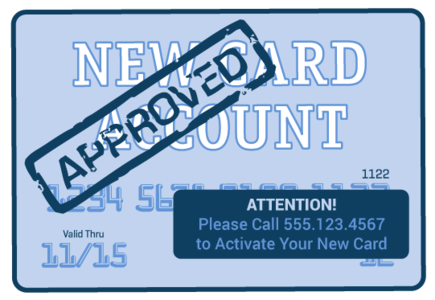
Congratulations! You have just been approved for a new credit card. But what does that announcement really mean? Do you now have an open account that will be reported to the credit bureaus, or does that only happen when you receive and activate your card? And when will the clock start ticking on any limited-time promotional financing offers?
What Happens When You're Approved for a Credit Card?
Upon approval of your application, the bank or credit union will open an account in your name. This will occur before the card is printed and mailed to you, and your account will be open even if you do not activate or use your card.
Opening a new credit card account has several implications. First, the credit card account will be reported to the major credit bureaus and they will use this information to calculate your credit score. In fact, this is good news as an open revolving charge account will increase the amount of available credit you have been extended. For a given amount of debt, having more credit will lower your credit utilization ratio, which will help your FICO credit score. Besides, if you never activate or use your card, it is impossible to incur more debt.
Nevertheless, if your card has an annual fee, you will still be billed for it, even if you haven't activated your card. In short, activating your credit card merely enables you to use the card itself, but otherwise does not affect your account in any way.
What About Promotional Financing Offers & Sign-up Bonuses?
Your credit card may have two other features that are tied to the date you opened your account. First, many reward cards offer sign-up bonuses that are contingent on spending a certain amount within a limited time. For example, the Chase Freedom card offers a $100 sign-up bonus when new cardholders make $500 in purchases within the first three months of opening an account. Cardholders should keep in mind that the clock starts ticking when the account is approved, not when the card is received, activated, or used for the first time.
Many cards also feature promotional financing on new purchases and/or balance transfers. These promotional financing periods are limited, but last a minimum of six months, and up to as long as 18 months. Once again, this time period is calculated from the day that the application is approved and the account is opened, not when the card is activated.
When is my Balance Reported to the Credit Bureaus?
Another confusing aspect of credit cards is when the credit bureaus learn about your balance. This occurs each month when your statement period closes. At that time, the statement is composed and mailed, while your current balance is reported to the three major credit bureaus. So even if you always pay your statements in full, and never pay interest, the credit bureaus will show your statement balance as "debt". After all, the card issuer has no way of knowing whether or not you will actually pay off this balance, and as far as they are concerned, it represents debt. Furthermore, the amount of debt reported will affect your credit utilization ratio and can impact your credit score.
For those who use only a small percentage of their available credit, this is no big deal. Yet those who charge a large amount of expenses each month should consider making a payment before their statement closing date, especially if they are planning to apply for a home or car loan in the next few months.
Credit card issuers do a poor job of disclosing which dates affect cardholders and their credit history, but the details are not that complicated. By understanding when card issuers open accounts and report customer balances, you can make the right decisions with your credit cards.
This article originally appeared on www.comparecards.com/blog: What Happens When You Open A Credit Card Account?
